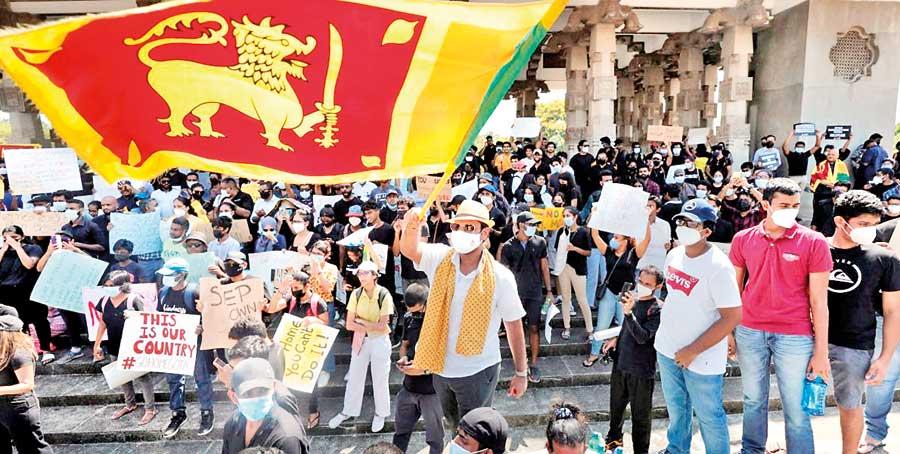02 Jan 2023 - {{hitsCtrl.values.hits}}

Failure to identify and utilise youth's talents and ideologies could push them to engage in anti-social activities
The dawn of the New Year is a time of hope. And hope comes with the energies of the younger generations. I often wonder what the political and economic prospects are for my students and the youth I come across in my work in the countryside.
wonder what the political and economic prospects are for my students and the youth I come across in my work in the countryside.
Crisis times
When my generation started university in the early 1990s, it was a different era. The Soviet Union had just collapsed, the Left movement was in retreat all over the world and neoliberal globalisation was in full swing. We read Francis Fukuyama’s thesis about the end of history and a new American Century in the making, and we were taught that through our individual efforts we can become prosperous. It was the time of start-ups and the dot com boom as the internet was claimed to transform economies where a borderless world without scarcity in the information economy will lead to endless prosperity.
Those inflated discourses, as it happens periodically with political economic shifts, were met with the realities of crises. The East Asian economic crisis of the late 1990s, the bursting of the dot com bubble in 2000, the defeats suffered by the American Empire with the war in Iraq in the mid-2000s and the global financial crisis of the late 2000s, made us realise the fragility of the global political economic order and our own prospects within it.
The younger generation I meet today do not project the inflated expectations that I saw in my youth. Globally, youth have been through the gruelling experience of the pandemic and related disruptions. And in Sri Lanka with the tremendous turmoil of the economic crisis, the necessities that youth took for granted until recently, such as a train ticket and even a lunch packet, are fast becoming out of reach.
In Sri Lanka with the tremendous turmoil of the economic crisis, the necessities that youth took for granted until recently, such as a train ticket and even a lunch packet, are fast becoming out of reach
While the youth are continued to be taught the lie that through their individual efforts all of them can succeed, their faces betray the bleak future before them. Abandoned by the realities of the crisis without social support, some sought avenues of struggle for change, including by participating in the great revolt of Aragalaya. Others, however, are turning more nihilist, including with cultures of violence and substance abuse.
This is the immediate future before them, either collective struggles of progressive change or nihilistic decline of self-destruction. What is at stake is not just the future of the youth, but the country as a whole. Indeed, during times of crisis, for better or for worse, it is the younger generations that determine the future.
Precarious future
The next few years with an economic depression are going to be gruelling. Unemployment is going to rise with little job prospects for the youth. And even those who turn to rural livelihoods are going to face shortages and price hikes of energy and inputs.
 It need not be so bad, but those at the helm of state power have chosen the path of austerity and wage repression. Abandoned by the state without social protection, as peoples’ protests mount, authoritarian repression is likely to be the response. Turning to political parties for alternative policies gives little hope as the political establishment as a whole has become delegitimised. The opposition parliamentarians have shown little meaningful leadership amidst the worst crisis the country is going through since independence.
It need not be so bad, but those at the helm of state power have chosen the path of austerity and wage repression. Abandoned by the state without social protection, as peoples’ protests mount, authoritarian repression is likely to be the response. Turning to political parties for alternative policies gives little hope as the political establishment as a whole has become delegitimised. The opposition parliamentarians have shown little meaningful leadership amidst the worst crisis the country is going through since independence.
Politically and economically, Sri Lanka is now on a short fuse. The country could again be at boiling point in another three months. While general elections can be called in February to legitimise the discredited parliament, the President dependent on SLPP support will refuse to do so. Another point of pressure may emerge if farmers suffer major losses during the upcoming harvest season. The dry season affecting hydro power generation and disruptions to electricity services, as well as difficulties in managing the import bill affected by global commodity price changes, may further affect employment and livelihoods. Indeed, politics as with our rural economy is seasonal during a prolonged crisis.
What will and can our youth do in such precarious times. They can individually wallow down to the depths of self-destruction. Worse, they can descend into crime, gang culture and nihilistic violence
Organising and movements
What will, and can our youth do in such precarious times. They can individually wallow down to the depths of self-destruction. Worse, they can descend into crime, gang culture and nihilistic violence. Alternatively, their youthful energies can be put towards economic reconstruction by utilising the resources in their communities; agricultural production and local food systems require engagement. They could provide new hope to the country by organising on regional and national levels for social and political change.
All this depends on the capacity for organising and the social institutions that youth can build. Our history itself provides many lessons and examples. There were the high stakes insurrections and armed struggles that ended in tremendous disasters. But there are also many advances made socially, economically and politically, through the slow and steady work of trade unions and co-operatives. And there are the many forceful and militant mobilisations of youth over the last century such as the Jaffna Youth Congress in the 1920s engendering an anti-colonial vision, the Suriya Mal movement in the 1930s leading to the emergence of the Left movement, the anti-caste movement in Jaffna in the 1960s that provided an emancipatory outlook to oppressed caste youth, and the Mothers Front in the 1980s that politicised a younger generation of women’s rights activists. There are echoes of those traditions of organising in the struggles over the last two years.
The political and economic future of the country is now dependent on what the youth of the country do, particularly in relation to a new politics of gender, identity and class. And the progressive path forward will depend for the most part on their capacity for democratic cooperation and collective struggle. Are we ready to support the youth and their progressive movements to create the conditions for political and economic transformation?
09 Jan 2025 2 hours ago
09 Jan 2025 2 hours ago
09 Jan 2025 2 hours ago
09 Jan 2025 2 hours ago
09 Jan 2025 3 hours ago